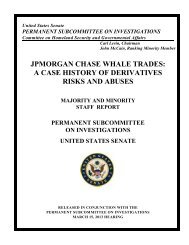JPMORGAN CHASE WHALE TRADES: A CASE HISTORY OF DERIVATIVES RISKS AND ABUSES
JPMORGAN CHASE WHALE TRADES: A CASE HISTORY OF DERIVATIVES RISKS AND ABUSES
JPMORGAN CHASE WHALE TRADES: A CASE HISTORY OF DERIVATIVES RISKS AND ABUSES
Create successful ePaper yourself
Turn your PDF publications into a flip-book with our unique Google optimized e-Paper software.
27<br />
banks’ deposits, the OCC is the primary prudential regulator of JPMorgan Chase Bank and its<br />
subsidiaries, including the CIO. 102 The OCC’s supervisory team includes approximately 65 onsite<br />
examiners who are responsible for reviewing nearly every facet of JPMorgan Chase’s<br />
activities and operations. 103 Several OCC examiners were responsible for overseeing the CIO. 104<br />
D. Capital Requirements<br />
One key regulatory tool for limiting risk at federally insured banks and ensuring banks<br />
meet their financial obligations involves requiring banks to meet minimum capital standards.<br />
Banks that are well capitalized can withstand losses without endangering deposits, collapsing, or<br />
seeking a taxpayer bailout. Banks that fail to maintain minimum capital levels can be deemed to<br />
be operating in an unsafe and unsound manner and required to take corrective action. 105<br />
Federal bank regulators have long required U.S. banks to maintain a minimum amount of<br />
capital, meaning money raised primarily from shareholders and retained earnings, adjusting the<br />
required level according to the amount and type of activities engaged in by the individual<br />
bank. 106 In general, the regulations require banks to maintain less of a capital cushion for safer<br />
activities, such as investing in Treasury bonds, and more of a capital cushion for riskier<br />
activities, such as trading synthetic credit derivatives. To carry out that approach, the regulations<br />
generally assign greater “risk weights” or “capital charges,” to riskier assets. 107<br />
United States capital requirements reflect the Basel Accords, a set of international<br />
standards on bank capital requirements issued by the Basel Committee on Banking<br />
108<br />
Supervision. Over time, the Basel Committee has issued four sets of capital standards. Basel<br />
I, issued in 1988, provided the first international capital standards; Basel II, issued in 1999,<br />
revised the first Accord, and was finalized in 2004; Basel 2.5, issued in 2009, strengthened<br />
capital standards related to securitizations and trading book exposures in response to the<br />
102<br />
See Testimony of Thomas J. Curry, Comptroller of the Currency, before the U.S. House of Representatives<br />
Committee on Financial Services, (June 19, 2012), at 11-12, http://www.occ.gov/news-issuances/congressionaltestimony/2012/pub-test-2012-91-written.pdf.<br />
103<br />
Id. at 11.<br />
104<br />
For more information about OCC oversight of the CIO, see Chapter VI.<br />
105<br />
See, e.g., OCC enforcement authority codified at 12 C.F.R. § 3.14, and the Federal Deposit Insurance<br />
Corporation (FDIC) enforcement authority codified at 12 C.F.R. Part 325.<br />
106<br />
See, e.g., OCC minimum capital requirements, 12 C.F.R. Part 3, including Appendices A-C.<br />
107<br />
See, e.g., OCC minimum capital requirements, 12 C.F.R. Part 3, Appendix A, and FDIC minimum capital<br />
requirements, 12 C.F.R. Part 325, Appendix C.<br />
108<br />
The Basel Committee on Banking Supervision (BCBS), first established in 1974, is an international body<br />
composed of representatives from countries with major banking centers, including the United States and the G-20<br />
countries. See “Basel Committee on Banking Supervision,” Basel Committee on Banking Supervision, Bank for<br />
International Settlements, http://www.bis.org/bcbs/index.htm. The Basel Committee’s recommendations do not<br />
have the force of law, but must be implemented by individual member countries using national laws and regulations.<br />
See “History of the Basel Committee and its Membership,” Basel Committee on Banking Supervision, Bank for<br />
International Settlements, http://www.bis.org/bcbs/history.htm. The BCBS is part of the Bank for International<br />
Settlements, an international organization, located in Basel, Switzerland, which supports and facilitates collaboration<br />
among central banks around the world. See “About BIS,” Bank for International Settlements,<br />
http://www.bis.org/about/index.htm.



